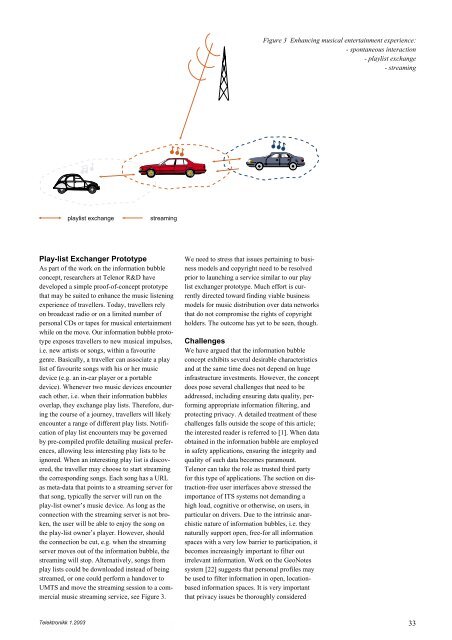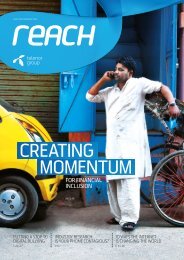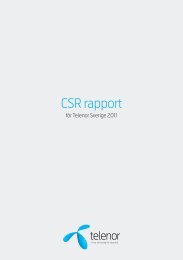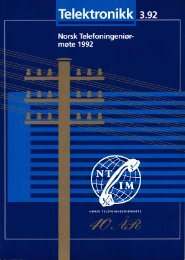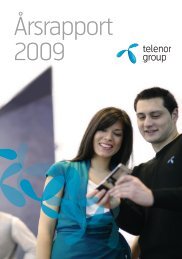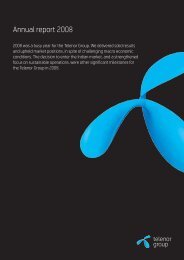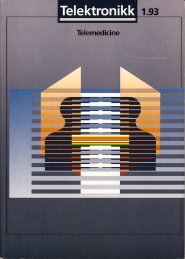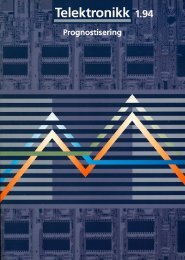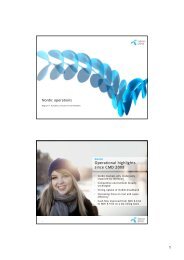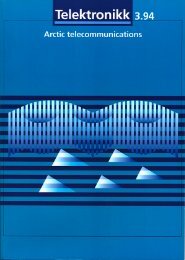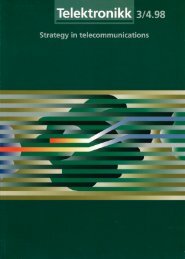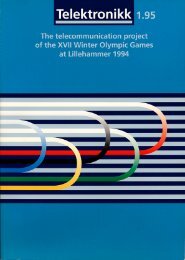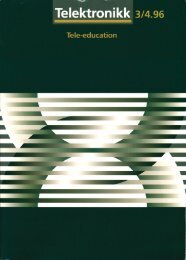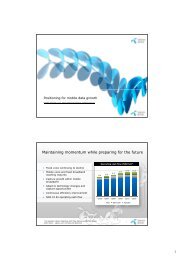Intelligent Transport Systems - Telenor
Intelligent Transport Systems - Telenor
Intelligent Transport Systems - Telenor
Create successful ePaper yourself
Turn your PDF publications into a flip-book with our unique Google optimized e-Paper software.
Telektronikk 1.2003<br />
playlist exchange streaming<br />
Play-list Exchanger Prototype<br />
As part of the work on the information bubble<br />
concept, researchers at <strong>Telenor</strong> R&D have<br />
developed a simple proof-of-concept prototype<br />
that may be suited to enhance the music listening<br />
experience of travellers. Today, travellers rely<br />
on broadcast radio or on a limited number of<br />
personal CDs or tapes for musical entertainment<br />
while on the move. Our information bubble prototype<br />
exposes travellers to new musical impulses,<br />
i.e. new artists or songs, within a favourite<br />
genre. Basically, a traveller can associate a play<br />
list of favourite songs with his or her music<br />
device (e.g. an in-car player or a portable<br />
device). Whenever two music devices encounter<br />
each other, i.e. when their information bubbles<br />
overlap, they exchange play lists. Therefore, during<br />
the course of a journey, travellers will likely<br />
encounter a range of different play lists. Notification<br />
of play list encounters may be governed<br />
by pre-compiled profile detailing musical preferences,<br />
allowing less interesting play lists to be<br />
ignored. When an interesting play list is discovered,<br />
the traveller may choose to start streaming<br />
the corresponding songs. Each song has a URL<br />
as meta-data that points to a streaming server for<br />
that song, typically the server will run on the<br />
play-list owner’s music device. As long as the<br />
connection with the streaming server is not broken,<br />
the user will be able to enjoy the song on<br />
the play-list owner’s player. However, should<br />
the connection be cut, e.g. when the streaming<br />
server moves out of the information bubble, the<br />
streaming will stop. Alternatively, songs from<br />
play lists could be downloaded instead of being<br />
streamed, or one could perform a handover to<br />
UMTS and move the streaming session to a commercial<br />
music streaming service, see Figure 3.<br />
We need to stress that issues pertaining to business<br />
models and copyright need to be resolved<br />
prior to launching a service similar to our play<br />
list exchanger prototype. Much effort is currently<br />
directed toward finding viable business<br />
models for music distribution over data networks<br />
that do not compromise the rights of copyright<br />
holders. The outcome has yet to be seen, though.<br />
Challenges<br />
We have argued that the information bubble<br />
concept exhibits several desirable characteristics<br />
and at the same time does not depend on huge<br />
infrastructure investments. However, the concept<br />
does pose several challenges that need to be<br />
addressed, including ensuring data quality, performing<br />
appropriate information filtering, and<br />
protecting privacy. A detailed treatment of these<br />
challenges falls outside the scope of this article;<br />
the interested reader is referred to [1]. When data<br />
obtained in the information bubble are employed<br />
in safety applications, ensuring the integrity and<br />
quality of such data becomes paramount.<br />
<strong>Telenor</strong> can take the role as trusted third party<br />
for this type of applications. The section on distraction-free<br />
user interfaces above stressed the<br />
importance of ITS systems not demanding a<br />
high load, cognitive or otherwise, on users, in<br />
particular on drivers. Due to the intrinsic anarchistic<br />
nature of information bubbles, i.e. they<br />
naturally support open, free-for all information<br />
spaces with a very low barrier to participation, it<br />
becomes increasingly important to filter out<br />
irrelevant information. Work on the GeoNotes<br />
system [22] suggests that personal profiles may<br />
be used to filter information in open, locationbased<br />
information spaces. It is very important<br />
that privacy issues be thoroughly considered<br />
Figure 3 Enhancing musical entertainment experience:<br />
- spontaneous interaction<br />
- playlist exchange<br />
- streaming<br />
33


